Episodes
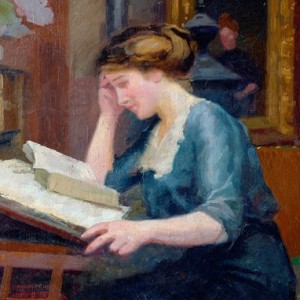
Tuesday Feb 12, 2019
Hard Texts and Charitable Reading with Dr. Tiffany Schubert
Tuesday Feb 12, 2019
Tuesday Feb 12, 2019
That nineteenth century German philosopher Friedrich Nietzsche’s point of view is incompatible with the vision, values, and mission of Wyoming Catholic College should come as no surprise to anyone. And the same can be said of thinkers such as Jean Jacque Rousseau, Sigmund Freud, Martin Heidegger, and Michel Foucault.
Yet Wyoming Catholic College students read all of them and more. And that makes sense since no one can understand our modern culture without confronting those thinkers.
Which brings up the question of how to read them—how to read any thinker with whom we disagree.
Dr. Tiffany Schubert has spent a long time thinking about how to read charitably, receiving even harsh and abrasive authors with kindness and sympathy.
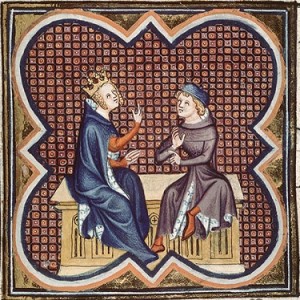
Tuesday Feb 05, 2019
The Medieval Mind of C. S. Lewis with Dr. Jason Baxter
Tuesday Feb 05, 2019
Tuesday Feb 05, 2019
Before C. S. Lewis was a novelist, spiritual writer, or Christian apologist, he was a scholar. Lewis served as a Fellow and Tutor in English Literature at Oxford University from 1925 until 1954 when he was made Chair of Medieval and Renaissance Literature at Cambridge University. That is Lewis’ primary calling was as a university professor and literary scholar.
His scholarly studies influenced all of Lewis’ writings from Narnia to the Space Trilogy from Screwtape to “The Weight of Glory” from The Abolition of Man to The Great Divorce and Till We Have Faces. Lewis’ popular books while speaking forcefully to our modern era are Medieval to the core.
Wyoming Catholic College Academic Dean Dr. Jason Baxter is, like Lewis, a student and scholar of Medieval and Renaissance literature. He has for years been reading over Lewis’s shoulder, studying the same books and authors.
This winter Dr. Baxter will be teaching a free distance learning course on “The Medieval Mind of C. S. Lewis.” To register, visit our website.
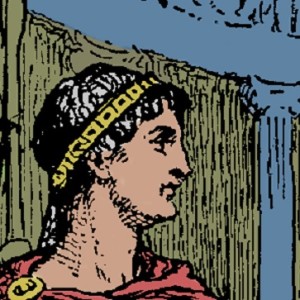
Tuesday Jan 29, 2019
Plutarch: Political Life and Personal Character with Dr. Pavlos Papadopolous
Tuesday Jan 29, 2019
Tuesday Jan 29, 2019
History is often concerned with great events—elections, revolutions, wars, battles, conquest, boom, and bust—and we’re used to reading history. That’s why we walk away slightly confused when someone says, “It must be borne in mind that my design is not to write histories, but lives.”
The ancient writer of Lives was the Roman Plutarch. His concern was character. "The most glorious exploits,” he wrote, “do not always furnish us with the clearest discoveries of virtue or vice in men; sometimes a matter of less moment, an expression or a jest, informs us better of their characters and inclinations, than the most famous sieges, the greatest armaments, or the bloodiest battles whatsoever.” His focus was “the marks and indications of the souls of men.”
Dr. Pavlos Papadopolous who has been teaching Plutarch this semester is our guest this week on The After Dinner Scholar.
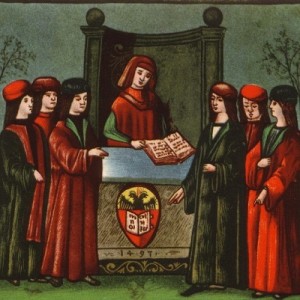
Tuesday Jan 22, 2019
Digging Deeper: The Junior Author Project with Dr. Kent Lasnoski
Tuesday Jan 22, 2019
Tuesday Jan 22, 2019
Mortimer Adler, legendary founder of the Great Books program at the University of Chicago observed, “In the case of good books the point is not how many of them you can get through, but rather how many can get through to you.”
While we hope that many of the books our students read in their four years at Wyoming Catholic "get through" to them, spring semester of junior year we provide a special opportunity to read one author deeply and thoughtfully. We call it Trivium 302, but it’s better known as the Junior Author Project
In the fall of junior year, each student selects an author whom he or she wishes to know more deeply. In the spring, under the tutelage of professors, the student reads one major and one minor work of that author along with a biography and the most important critical scholarship pertaining to their author and then writes a final paper.
One of the professors guiding students in their Junior Author Projects is our guest, Dr. Kent Lasnoski.
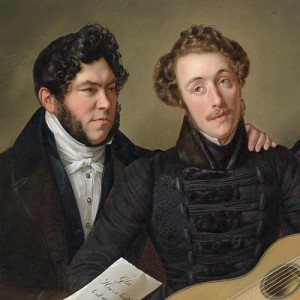
Tuesday Jan 15, 2019
The Gift of Friendship with Prof. Kyle Washut
Tuesday Jan 15, 2019
Tuesday Jan 15, 2019
“Life,” wrote the great Roman author Cicero, “is nothing without friendship.” And thus it has been since the beginning.
Looking at Adam alone in the splendor of Eden, God declared, “It is not good for the man to be alone” (Genesis 2:18). We humans are “hardwired to connect.” We need friends and without them, as St. Thomas Aquinas observed, “even the most agreeable pursuits become tedious.”
Yet in our day, loneliness has been called an epidemic and friendship a lost art. The results are not only poor psychological and social health, but, it has been clearly demonstrated, poor physical health as well.
Led by Wyoming Catholic College faculty, the 2019 Wyoming School of Catholic Thought will explore the meaning, the experience, and the practice of friendship “from The Iliad to Facebook”.
Prof. Kyle Washut was one of the Wyoming School faculty last year and will join us again this year. Prof. Washut is our guest this week on The After Dinner Scholar.
For more information about The Wyoming School of Catholic Thought, June 9-14, 2019, visit our website.
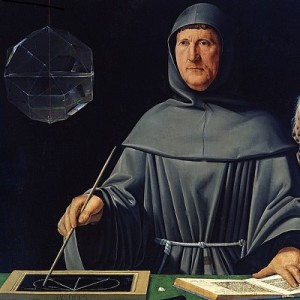
Tuesday Jan 08, 2019
Perfect Solids and Conic Sections with Dr. Henry Zepeda
Tuesday Jan 08, 2019
Tuesday Jan 08, 2019
At Wyoming Catholic, you can tell when geometry test is in the offing. Triangles, circles, and lines along with the propositions that go with them cover every spare white board and occasionally some windows as well as students discuss the diagrams with one another.
Plane geometry—that is, the geometry of two dimensional figures comes first. After that students make the quantum leap in to solid or three-dimensional geometry including perfect solids and conic sections.
In the classroom, many are taught by Dr. Henry Zepeda. Dr. Zepeda who joined the Wyoming Catholic College faculty this year is our guest this week on The After Dinner Scholar.
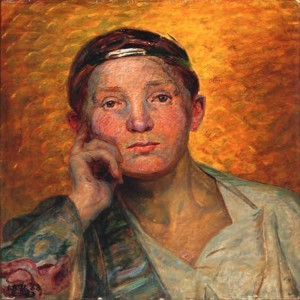
Tuesday Jan 01, 2019
Getting Wisdom in 2019 with Dr. Jeremy Holmes
Tuesday Jan 01, 2019
Tuesday Jan 01, 2019
“What does it mean to be wise?” a psychologist recently asked an 8-year-old and an 88-year-old from different parts of the world. “Their answers,” she reported, “were remarkably similar: to know a lot.”
If wisdom was simply a question of knowing a lot, we would need to conclude that Americans today are by far the wisest generation to live. After all, thanks to the internet, we know a lot about a lot of things. But is access to knowledge, to data really the definition of wisdom? Isn’t wisdom more a matter of how we live than about what we know?
Of the 73 books in our Bibles, we classify seven as “wisdom books.” Those are Job, Psalms, Proverbs, Ecclesiastes, Song of Solomon, Wisdom of Solomon, and Sirach. And for most people, aside from Psalms, the books seem rather elusive.
To help us understand wisdom and the wisdom books as we embark on a new calendar year, we’re joined by theologian Dr. Jeremy Holmes.
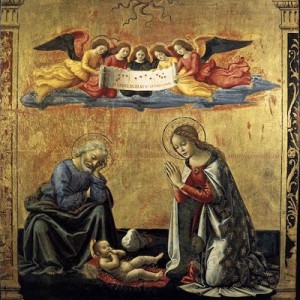
Tuesday Dec 25, 2018
Poetry for the Feast of Christmas with The Wyoming Catholic College Faculty
Tuesday Dec 25, 2018
Tuesday Dec 25, 2018
‘Twas the night before Christmas, when all through the house
not a creature was stirring, not even a mouse.
Those first lines from Clement Clarke Moore’s “A Visit from St. Nicholas” may be the most recognized line of Christmas poetry in America—or perhaps the most recognized line of any kind of poetry in America. Yet Christmas, Christ’s nativity has been the subject of many, many great poems.
As a Christmas gift to you our listeners, this Christmas podcast will focus on great Christmas poems—recited, not discussed by Wyoming Catholic College faculty. Enjoy.
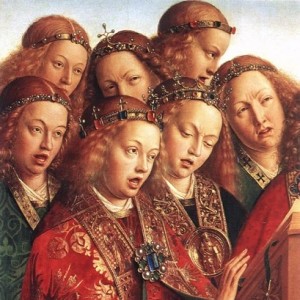
Tuesday Dec 18, 2018
Choirs of Angels, Choirs of College Students with Prof. Christopher Hodkinson
Tuesday Dec 18, 2018
Tuesday Dec 18, 2018
Someone new attending a midweek college mass might wonder why more students don’t attend. Then, as communion is about to begin, the question is answered. Nearly half the congregation on any given weekday is in the choir loft.
Choir, while a big commitment that begins with an audition, remains the most popular extracurricular activity at Wyoming Catholic College.
his year, Prof. Christopher Hodkinson has joined the college faculty as Instructor of Music and Fine Arts and Director of Music. Prof. Hodkinson who grew up in Nottingham, England is a graduate of Cambridge University and for the last five years was Director of the Schola Gregoriana of Cambridge. Prof. Hodkinson is our guest this week on The After Dinner Scholar.
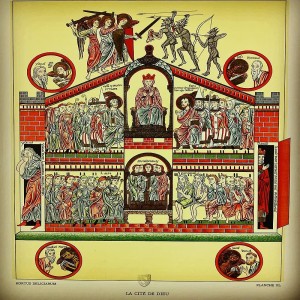
Tuesday Dec 11, 2018
St. Augustine, the City of God, and the City of Man with Dr. Virginia Arbery
Tuesday Dec 11, 2018
Tuesday Dec 11, 2018
In AD 380, not long before the sack of Rome in 410, the Emperor Theodocius had declared Christianity the official religion of the Empire. Perhaps, many argued, that was the problem. Many worshiped Jesus abandoning the old gods of Rome—Jupiter, Juno, Minerva, Apollo, Aphrodite, and the rest. No doubt those gods sent the barbarians to destroy the city as punishment for the lack of piety.
In Roman North Africa, there was a town called Hippo. And the bishop of Hippo, Augustine, got wind of those arguments, picked up his pen, and began writing what has become one of the world’s greatest apologetic and greatest political treatises: The City of God.
Wyoming Catholic College students study The City of God as sophomores and then again as seniors. At least once and sometimes twice, their professor is political philosopher, Dr. Virginia Arbery. Dr. Arbery is our guest this week on The After Dinner Scholar.

